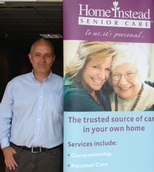Ensuring an older person has a regular home carer 'needs to be at the heart of the care service being delivered'

Home care providers are urging more agencies to focus on ensuring clients receive home care from a regular carer to provide dignified care to every client.
A 93 per cent rise in the number of over-90s in England brought to A&E over the last five years was announced last week, with over double the number of vulnerable older people taken by ambulance.
Mike Padgham, chair of the United Kingdom Home Care Association (UKHCA) blamed the rise in older people going to A&E via ambulance on cuts in local authority social care spending.

He said: “Regular visits by homecare workers are, arguably, a far more important factor in enabling people to live their daily lives safely and independently in their own homes than GP services.
"With a massive reduction in the number of people eligible to receive this vital service, combined with care commissioned by Local Authorities in a way that risks people’s human rights, the evidence is clear – Government is failing in its duty to support vulnerable and older people properly.
“We call on the Government to redress urgently the cuts in social care funding being implemented by Local Authorities and to direct funding to social care services. This will improve the quality of life for hundreds of thousands of people and deliver savings by reducing the need for the far more expensive care that results from emergency hospital visits.
“Andy Burnham is absolutely right to say that a crisis in care has led to the massive increase in older people being rushed to already over-stretched hospital A&E departments. This is a direct result of the draconian cuts in Local Authority spending on social care.”
Linking the rise of older people forced to visit accident and emergency services with the cuts in social care, Mr Padgham said it is regular home carers that play the most important role in helping older people to live safely in their own home and minimise emergency hospitalisation.
Ethical charter
Unison’s Time to Care report was published in 2012 as part of its Ethical Care charter to improve care services in the UK. The report found nearly 40 per cent of home care workers said they were often allocated different clients which affected care continuity and prevented clients forming a relationship with care workers.
Unison found very low pay is creating high level of staff turnover, causing vulnerable people to have a succession of new home care staff.
It found rushed visits from irregular carers were a false economy, and caused a greater likelihood of falls, medication errors and deterioration through loneliness.
The Ethical Care charter outlines a set of values to maximise the continuity of care being delivered to older people in the community.
The charter wants clients to be allocated the same home carer wherever possible, and replace zero hour contracts with permanent ones to minimise high staff turnover.
Continuity of care
The recent 15 minute home care scandal has challenged providers to justify the length of time older and vulnerable are being cared for, with a report by Leonard Cheshire Disability finding over two thirds of councils commission 15 minute visits.
However providers are coming forward to claim it is the continuity of care received by older and vulnerable people and not just the length of time which can make a true difference in the protection of their quality of life.
Care from a regular and recognised carer is being championed by home care professionals as a successful way to create a trusted environment for crucial and often personal care to take place.
Nicki Bones, operations director at SweetTree Home Care Services, said: “It is essential that care provided at home to older people and people with disabilities is truly focused on the individual, putting the client at the centre of making informed choices. 
“There is a consensus that person centred care supports high quality care, but in addition to this the continuity of care team members is essential and enables meaningful relationships to be built.
“Continuity of a care team that understands the client and their support needs has an impact on the person’s well-being and physical health. For a client to have carers in whom they can trust means that they have the opportunity to confide in someone and express any fears or concerns.
“When a carer knows a client well, they also notice minor changes in health and well-being, things that a team member who does not know the client well maybe wouldn’t see. This ability to see change enables on-going consistent monitoring and swift referral to other services, such as the GP, as required.
“When a client has memory loss or confusion, or any changing behaviour, a care team member will know what the client needs, or would normally choose."
Andrew Pickup managing director of home care provider Optalis said: “As a care organisation that goes out of its way to understand what is important to our customers, we know for a fact that continuity of care is one of the most important aspects of what is defined as 'good care.'
“It is right to add this to the quality care debate and I think it should take centre stage – if you're not providing continuity of care, you're not providing what the customer wants.”
 Optalis are the first organisation to measure its performance for providing continuity of care and has urged other providers in the sector to start doing the same.
Optalis are the first organisation to measure its performance for providing continuity of care and has urged other providers in the sector to start doing the same.
Dignified care
Dignity Action Day, run by the National Dignity Council, was marked on 1 Feb 2014 throughout the country with the aim of changing the culture of care services so that dignity and quality of care is of highest importance.
Jan Burns, the Dignity Councils independent chair commented: “Dignity action day is an annual event where everyone is invited to be part of a nationwide campaign to promote dignity. We hear a great deal of negativity about how poorly health and social care services are delivered, well Dignity Action Day gives everyone the opportunity to challenge that belief.
“It is time to show that there is some wonderful work going on across the country that upholds people's dignity at every opportunity. Dignity is everyone's business – it should be in the heart, mind and actions.”
Sharing the view of the Dignity Council is Bryn Evans, of Home Instead Senior Care in Sheffield, an independent home care provider which tailors care to the needs of its clients.  He said: “If care is to be dignified, and it absolutely has to be, then continuity of care needs to be at the heart of the care service being delivered. Many clients put up barriers for fear of sharing personal care needs, but over time, the relationships formed can break down those barriers and we are able to help ensure people can remain at home safely and securely.
He said: “If care is to be dignified, and it absolutely has to be, then continuity of care needs to be at the heart of the care service being delivered. Many clients put up barriers for fear of sharing personal care needs, but over time, the relationships formed can break down those barriers and we are able to help ensure people can remain at home safely and securely.
“It goes without saying that if you have someone visiting you at home on a regular basis then it’s important that you know and trust them. This is particularly true when caregivers are delivering personal care for a client but is also important for companionship care.
“Our caregivers know their clients so well they are immediately able to sense if something is wrong. This could be a subtle change in a client’s mood or the onset or deterioration of a health issue. Because our caregivers become a trusted friend they are able to help resolve these issues, often before they become a problem.”
Latest Features News
 28-Nov-19
2019 Election: Labour pledges £10.8 bn for free personal care while Boris Johnson sidelines social care
28-Nov-19
2019 Election: Labour pledges £10.8 bn for free personal care while Boris Johnson sidelines social care
 18-Oct-19
Podcast: Wendy Mitchell and dementia: 'My biggest fear is not knowing who my daughters are'
18-Oct-19
Podcast: Wendy Mitchell and dementia: 'My biggest fear is not knowing who my daughters are'
 30-Sep-19
World's oldest diver aged 96 says 'never accept the fact you are getting old'
30-Sep-19
World's oldest diver aged 96 says 'never accept the fact you are getting old'
 27-Sep-19
Exclusive: Care minister backs care workers' call for time off to grieve and attend funerals
27-Sep-19
Exclusive: Care minister backs care workers' call for time off to grieve and attend funerals
 20-Sep-19
Podcast: Gyles Brandreth urges care workers to learn poetry with elderly
20-Sep-19
Podcast: Gyles Brandreth urges care workers to learn poetry with elderly